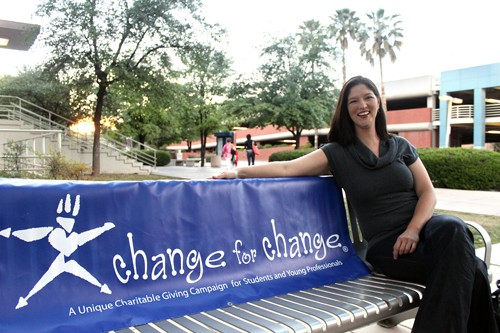Susan Baker is a UA graduate student and president of the UA chapter of Change for Change, the first chapter to hit the West Coast.
“”We’re the first chapter in the West … that’s my little point of pride,”” Baker said.
The club, which currently has 25 members, is open to all students and majors, though it is mostly a combination of education and business majors.
“”Today’s young university student, it seems, is really mindful of global issues and making social changes,”” Baker said.
Change for Change at the UA started in February 2009 and raised about $1,300 in coin collection, plus $2,000 from a benefit dinner in the first two months. This year, its benefit dinner and recent golf tournament raised approximately $6,300, and there’s more.
“”We’re not even really finished with the year; we’re still going to do some coin collections in the residence halls,”” Baker said. “”That’s almost $10,000 in a year’s time frame.””
The golf tournament was this past weekend at Randolph Golf Course. Those who played paid $80 for 18 holes of golf, lunch and a goodie bag.
“”We had so many things to give away,”” Baker said. “”It was really amazing to get all the generosity of the local businesses and even the university, even in economically challenging times.””
Change for Change focuses specifically on donating money to an educational program in rural Guanajuato, Mexico called Resplandor International. The educational community center includes classrooms and dorms for visiting professors, staff and students to stay in ecologically sustainable buildings.
Baker said working on the program has been a rewarding experience.
“”It’s not like an organization where you spend all this time making money, and you don’t get to see where it goes,”” she said. “”We have members actually going to the center and working with students.””
A portion of the funds Change for Change raises goes toward UA student scholarships for those who are interested in doing research projects at the Resplandor Center.
“”I think it’s a really successful way to organize students to be entrepreneurs and form the aspect of having a larger vision in life,”” said Juliana Urtubey, a graduate student. “”I think because we have a very specific purpose our group is able to collaborate so well.””
Urtubey said she thinks the key to generating more interest and commitment to the program from students is to take them to Mexico so they can see the value of the community center firsthand.
Todd Fletcher, a professor in the College of Education and the Change for Change advisor, said the program is a great opportunity for students to step outside of themselves, experience a different culture and think about others.
“”Mexico is not a very popular place at the moment, but people have needs that aren’t being met … and anytime that you can focus and work together as a team, there’s so much that can be accomplished,”” Fletcher said.
Baker said there is a lot of planning to expand the center in the future, which is currently run entirely by volunteers. For now, the group is just trying to fund the basic utilities at the center, such as electricity.
“”We’d like to at least have a kind of director,”” she said. “”And in order to build a library and the early intervention center … it’s going to take about $30,000.””









